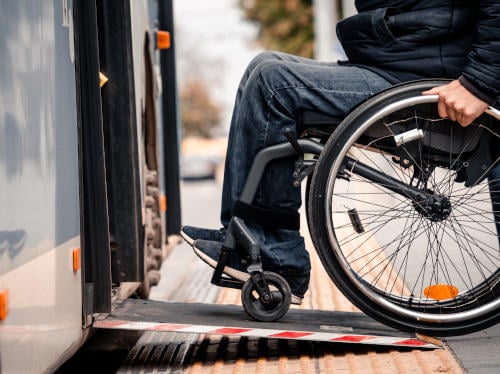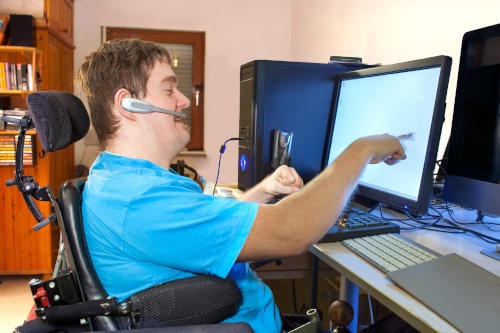One of Jodie Greer’s earliest memories is being at school aged five or six. “I had a friend with a speech impediment,” she recalls. “The teacher asked me to sit next to him so I could ‘translate’. Even though I was very young, I remember thinking how unfair it was and wondering why the teacher couldn’t make the effort to understand my friend himself.”
That sense of injustice has stayed with her and she has gone on to make a successful career out of persuading organisations to support people with disabilities of all kinds. Even so, she didn’t set out with that goal in mind and started her career with a number of management roles in a large, international oil and gas company.
Passionate About Supporting Disabled People

“I still had that passion but I didn’t know what to do with it,” she comments. “Then I went to a disability-awareness event at work and I was hooked. I knew this was what I wanted to do.”
Jodie’s first goal, she says, was to convince the oil company to improve physical access to its buildings not only for wheelchair-users but for people with all kinds of challenges such as those with neurodiversities who might be overwhelmed by, say, the lights and noise in an entrance hall.
“To achieve these changes, you have to be able to influence senior staff,” she points out. “I never cared about hierarchies so I was happy to knock on anyone’s door. I used to call myself a ‘gob on a stick’. I think they knew I wouldn’t go away until I’d got them to agree!”
Systems Also Need to Cater for Disability

Eventually, having initiated adjustments in all the company’s UK properties, Jodie did the same in their overseas facilities and then turned her attention to office equipment and interiors.
“You can get different keyboards for different disabilities or specialist software such as speech-to-text,” she explains. “It also matters where you place someone’s desk. ‘Hotdesking’ (where employees sit anywhere that’s vacant) won’t work for someone visually-impaired, for example. They need a permanent place where they won’t trip over their colleagues.
“On the other hand, someone who’s neurodiverse might need an office with walls rather than an open-plan environment,” she continues. “It’s also good to have a break-out space where people can go to take time-out if they experience sensory overload.”
Seeing Things from the Disabled Person’s Point-of-View

Another important aspect of helping people with disabilities, Jodie points out, is ‘soft’ skills such as people-management and sympathetic working-practices.
“A lot of the time, feeling supported at work depends on how understanding your line-manager is. It’s also about educating colleagues. I had one new employee approach me for advice – she had a diagnosis of autism and didn’t know whether she should tell her manager. In the end, we ran a workshop with her manager and colleagues where she explained a bit about her experiences. It was very successful and she’s now become a bit of a ‘poster girl’ for autism!”
Spreading the Word About Inclusivity

During the pandemic, after thirteen years with the oil company, Jodie decided to leave the 9-to-5 world behind and set herself up as disability inclusion consultant. She now advises a wide range of organisations on how to look after differing needs in the workplace and has worked with colleges, the police, IT companies and insurance firms, as examples.
Small companies are easier to influence in some way, she says, because a small team can talk directly to each other and share ideas. However, a possible downside can be less money to spend on making improvements. And although large organisations often have bigger budgets, that is sometimes spread thinly over lots of different projects.
Inclusivity Helps Everyone

Jodie maintains that disability inclusion is essential in all areas of life for a number of reasons. “Disabled people are the biggest minority group,” she asserts. “There are more than one billion in the world. Also, it’s a group we could all find ourselves joining at any point. It’s unlikely that anyone will wake up one morning and find they’re gay but they might wake up and find themselves disabled. It’s about making the world work for the people in it.”
It’s also important, she concludes, for non-disabled people to become ‘allies’ for their disabled friends and colleagues, helping them in all aspects of life.




